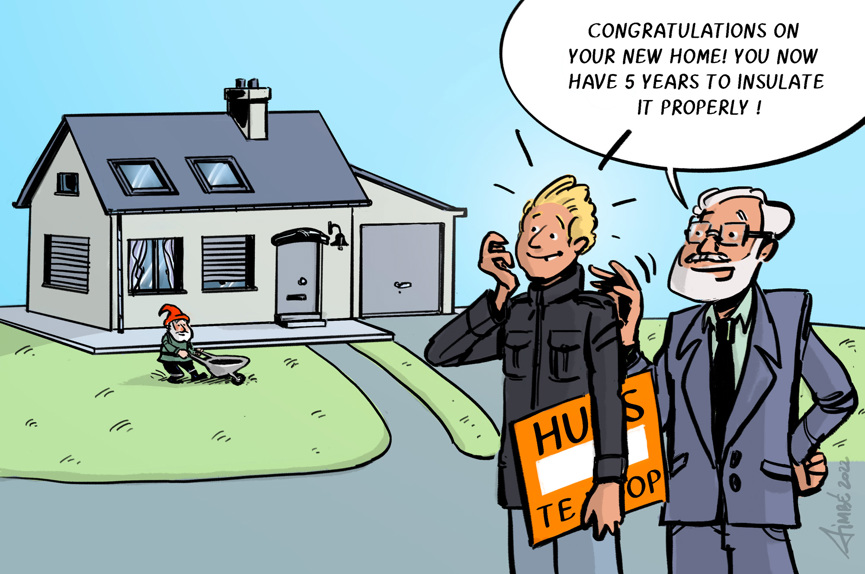- Construction Law
- renovation , renovation is obliged , residential property , renovation obligation , meet the energy standards , D energy label , acquisition , transfer of a building , obligation to renovate , law firm in Belgium , law firm in Brussels
This has been announced for a long time, but now it became real.
As from 1 January 2023, property owners will no longer be able to avoid the renovation obligation for residential properties in Flanders.

1. What exactly does this mean?
For non-residential buildings, i.e. buildings that are not intended to be used for housing, the regulation already applied as from 1 January.
Now, one year later, the same obligation applies for residential buildings, i.e. those intended for housing.
The obligation to renovate means that anyone who buys a house or a flat, from 1 January 2023 onwards, will have a period of 5 years to ensure that the house meets the energy standards in such a way that it can be awarded a D energy label.
The 5-year period starts from the date of the deed of sale at the notary's office. If you buy a building that has been awarded a less favourable energy label than D, bear in mind that there is a time limit that cannot be forgotten.
2. When will this obligation apply?
From now on, the obligation to renovate will be mentioned in all notarial deeds that relate to the transfer of full ownership (which means classic sales), as well as in the establishment of a right of superficies or a long lease right.
For other forms of transfer, such as, inter alia, the transfer of shares or the transfer by inheritance, the obligation will not apply.
In this respect, a few observations must be made.
Once the obligation to renovate has arisen, it remains valid, even if the building is subsequently transferred by way of inheritance or donation, for example.
The term of the obligation, which begins as from the deed of transfer of a building, the establishment of a right of superficies or a long lease right, inheritance, donation or sale, is not interrupted and the obligation passes to the successors, whether the heirs, the purchaser, the beneficiary, the holder of the right of superficies or the long lease right. This person must then, before the expiration of the term, meet the minimum energy performance level that was originally intended to be achieved.
If the minimum energy performance level that was to be achieved has become more stringent in the meantime, the new owner or the holder of the right of superficies or long lease right is obliged to comply with this more stringent minimum performance level within the remaining period of the term after the notarial deed has been signed.
3. What happens in the event of a merger, scission or takeover of a company?
For companies, the obligation to renovate will not apply in principle when they are split up, merged or taken over.
However, if an obligation to renovate already exists before the scission, merger or takeover of a building of one of the entities, then the successor must, within the remaining period of time, fulfil the obligations to meet the minimum energy threshold.
An existing obligation therefore passes with it in the event of a demerger, merger or transfer of shares.
4. Demolition or protected building?
If a building is demolished within 5 years of its acquisition, then the obligation to renovate will not apply. The same applies to temporary buildings, buildings that have been in use for less than 2 years.
Also residential buildings which are protected, which are part of a culturally-historically protected landscape, a town or a pretty village or which are listed in the inventory of real estate heritage, are exempt from the renovation obligation.
5. Obligation to mention it in the deed
The obligation to renovate must not only be complied with but must also be recorded in private contracts as well as in the notary deed.
It is therefore important to give full attention to this obligation when drawing up an agreement.
6. What happens after 2023?
The D-label is only the first step towards energy savings in all houses. More stringent measures will follow in 2028, 2035, 2040 and 2045, with the aim of giving all houses an A-label by 2050.
This is an ambitious project, especially considering that the obligation to renovate is only applicable in the case of a transfer and therefore does not apply when there is no sale, transfer of rights of superficies or long lease rights. Furthermore, the question arises whether the same A-label that is valid today will still be valid around 2050.
7. What sanction should be adopted?
Failure to acquire a minimum D-label in time within the agreed period of 5 years is punishable with administrative fines of EUR 500 up to EUR 200,000.00. Given the seriousness of the sanction, it is best to comply with the obligation.
It makes no sense to save the cost of energy-savings work in order to avoid the fine, because, even if you incurred a fine, the obligation to carry out the work remains anyway.
You will only be given a new deadline to obtain the label again in this way.
If you have any questions about this, please contact our specialists at info@seeds.law or +32 (0)2 747 40 07.





